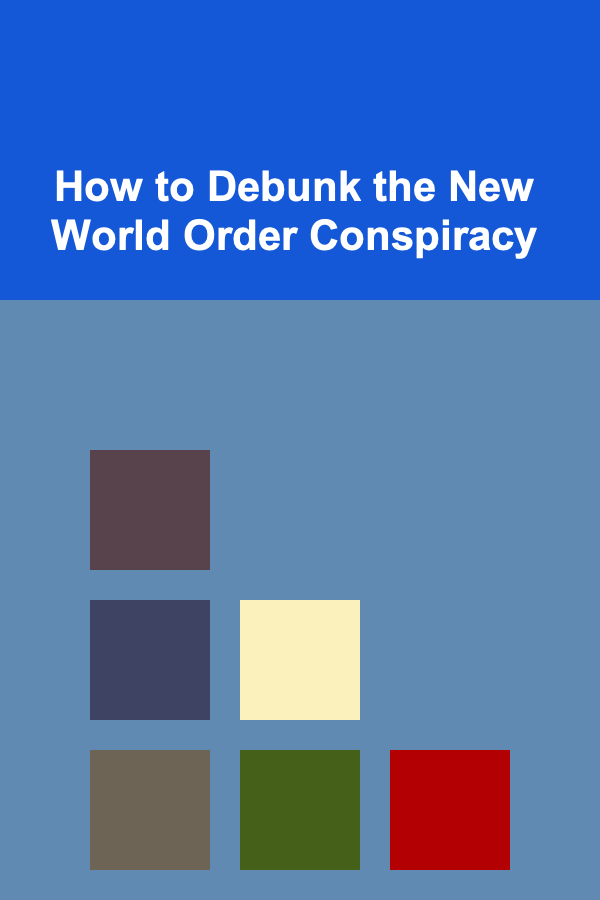
How to Debunk the New World Order Conspiracy
ebook include PDF & Audio bundle (Micro Guide)
$12.99$6.99
Limited Time Offer! Order within the next:

The "New World Order" (NWO) is a term that has gained prominence in conspiracy theory circles over the last few decades. According to these theories, a secretive, powerful elite is working behind the scenes to control the world's political, economic, and social systems. This group allegedly seeks to establish a totalitarian global government, erasing national borders and instituting a single, global authority. While the theory has no factual basis and is rooted in misinformation, fear, and distortion of reality, its appeal persists. In this article, we will explore the key aspects of the NWO conspiracy theory, analyze its origins, and provide clear, rational debunking of its claims.
Understanding the NWO Conspiracy
The NWO conspiracy theory posits that powerful individuals or organizations secretly control the world, manipulating governments, economies, and societies to their advantage. It is often associated with terms such as globalism, elitism, and secret societies. The conspiracy theory suggests that these shadowy elites are aiming for a one-world government or a totalitarian regime that will strip individual freedoms and establish an iron-fisted rule.
Key elements commonly associated with the NWO theory include:
- Globalism: The idea that a group of elites wants to erase national borders in favor of a single global government.
- Secret Societies: Conspiracy theorists often point to groups like the Illuminati, Freemasons, and Bilderberg Group as evidence of covert organizations manipulating world events.
- Economic Control: The theory suggests that the NWO controls global financial systems, using economic policies to consolidate power and wealth.
- Surveillance and Loss of Civil Liberties: A key claim is that the NWO seeks to control the population through surveillance and the erosion of civil rights.
- One-World Government: Ultimately, NWO conspiracy theorists argue that these elites aim to establish a centralized world government that rules over all nations.
While these claims may seem plausible to some, they are based on flawed reasoning, selective evidence, and unfounded speculation. The goal of this article is to systematically address and debunk the NWO conspiracy theory.
The Origins of the NWO Conspiracy Theory
The roots of the NWO theory can be traced to several sources in history. One of the earliest references to the concept can be found in the writings of figures like John Robison and Auguste Comte, who wrote about secret societies manipulating political affairs. However, the modern incarnation of the NWO theory emerged during the Cold War, with heightened fears of communism and global conflict.
In particular, the NWO conspiracy theory gained traction during the late 20th century, when global events such as the formation of international organizations (e.g., the United Nations, the European Union) were misinterpreted as signs of a growing globalist agenda. As the world became more interconnected through advances in technology and communication, conspiracy theorists saw these changes as part of a grand design orchestrated by powerful elites.
Key Influences on the NWO Conspiracy
- The Rise of Internationalism: The formation of the United Nations (UN) after World War II, as well as the establishment of other international organizations, provided fodder for conspiracy theorists. These organizations were often portrayed as stepping stones towards a world government.
- The Cold War: The ideological battle between the capitalist West and the communist East led to fears of global domination by one side. In the NWO conspiracy narrative, this fear was transformed into the idea that a powerful group of elites was working in the shadows to control the global political system.
- The Bilderberg Group: A secretive annual meeting of influential figures from politics, business, and finance, the Bilderberg Group became a focal point for conspiracy theorists, who believed that it was a gathering of elites plotting global domination.
- The Internet and Social Media: The proliferation of the internet and social media in the late 20th and early 21st centuries allowed conspiracy theories to spread more easily. Algorithms on social platforms like YouTube and Facebook contributed to the rapid dissemination of NWO-related content, fostering a growing belief in the theory.
Common Misconceptions in the NWO Theory
Several key misconceptions are central to the New World Order conspiracy theory. These misconceptions often distort reality, contributing to the spread of misinformation. Below, we will debunk some of the most pervasive myths.
1. The Existence of a Secret Global Elite
One of the primary claims of the NWO conspiracy is that a small group of wealthy elites controls global politics, economics, and social systems. These elites are said to operate behind the scenes, manipulating governments and organizations to achieve their goals of global dominance.
Debunking the Claim:
The claim of a secret, unified group of elites controlling the world lacks evidence. The global political and economic systems are complex and involve numerous competing interests. While certain powerful individuals or organizations may exert influence, there is no central, coordinated group that controls all aspects of global governance. World leaders, political parties, and organizations often have conflicting interests, which makes the idea of a single, shadowy group controlling everything implausible.
Moreover, the mechanisms of power in modern societies---such as democratic elections, free markets, and public accountability---ensure that no single entity can wield absolute control. While corruption and corporate influence are legitimate concerns, they do not point to a coordinated global conspiracy.
2. The Push for a One-World Government
The NWO theory asserts that elites want to create a one-world government to consolidate their power and strip away national sovereignty.
Debunking the Claim:
The idea of a one-world government is not supported by the facts. While international cooperation is crucial for addressing global issues---such as climate change, trade, and security---there is no evidence of an intentional push to create a centralized global government. Organizations like the UN and the EU exist to facilitate international cooperation, but they do not seek to undermine national sovereignty.
Furthermore, global politics is characterized by a wide range of competing interests. Different nations have their own agendas, and their participation in international organizations is voluntary. The idea that all nations would submit to a single, authoritarian government is unrealistic and ignores the complexities of global governance.
3. The Control of Global Financial Systems
Another common claim within the NWO conspiracy theory is that a group of elites controls the global financial system, using it as a tool to manipulate the world's economies.
Debunking the Claim:
While the global financial system is indeed complex and heavily influenced by large financial institutions, there is no evidence of a coordinated, secret group pulling the strings. The global economy is shaped by a variety of factors, including market forces, government policies, technological advances, and consumer behavior.
Central banks and international financial organizations, such as the International Monetary Fund (IMF) and the World Bank, play a significant role in the global economy, but they operate within established frameworks that are subject to public scrutiny and political oversight. The idea that a small group of people secretly controls these institutions to advance a nefarious agenda is not grounded in reality.
4. Surveillance and Loss of Civil Liberties
Conspiracy theorists often claim that the NWO seeks to control the population through widespread surveillance and the erosion of civil liberties.
Debunking the Claim:
The use of surveillance technology by governments and corporations raises important privacy concerns, but this does not indicate a global conspiracy to control the populace. Surveillance programs are generally intended for security, law enforcement, and intelligence purposes, rather than to subjugate the population.
Moreover, the erosion of civil liberties is typically a result of specific political and legal factors, such as authoritarian regimes or poorly regulated technologies, rather than a coordinated conspiracy. The protection of civil liberties is an ongoing issue in democracies, with activists and organizations working to safeguard individual rights and freedoms.
5. The Role of Secret Societies
A key element of the NWO conspiracy theory is the belief in secret societies, such as the Illuminati or Freemasons, controlling global events.
Debunking the Claim:
While secret societies have existed throughout history, there is no credible evidence to support the claim that they control world affairs. The Freemasons, for example, are a social organization with a long history of charitable and community service work. The Illuminati, a group that originated in the 18th century, was disbanded soon after its formation and has not existed as a secret organization for centuries.
Conspiracy theorists often point to the mere existence of these organizations as evidence of their sinister influence. However, this is a fallacy known as "guilt by association." Just because a group is secretive or influential does not mean that it is part of a global conspiracy to control the world.
Conclusion: The Importance of Critical Thinking
The New World Order conspiracy theory is built on a foundation of fear, misinformation, and misinterpretation of real-world events. While there are certainly real-world power structures and economic inequalities that merit scrutiny, the idea of a unified group of elites controlling the world is unfounded and lacks empirical support.
To debunk conspiracy theories like the NWO, it is crucial to engage in critical thinking, seek credible sources of information, and question the assumptions behind such claims. By doing so, we can better understand the complexities of global politics and economics, and avoid falling victim to the allure of sensational and unfounded theories.

How to Create a Cozy and Inviting Bedroom on a Budget
Read More
How to Ensure Your Technology is Ready for Online Learning
Read More
How to Implement File Security and Privacy in Your Organization
Read More
How to Make Money Online as a Physical Therapist Assistant? 10 Actionable Ideas
Read More
How to Soundproof a Home Theater Room on a Budget
Read More
How to Use Mass Loaded Vinyl for Effective Soundproofing
Read MoreOther Products

How to Create a Cozy and Inviting Bedroom on a Budget
Read More
How to Ensure Your Technology is Ready for Online Learning
Read More
How to Implement File Security and Privacy in Your Organization
Read More
How to Make Money Online as a Physical Therapist Assistant? 10 Actionable Ideas
Read More
How to Soundproof a Home Theater Room on a Budget
Read More